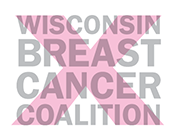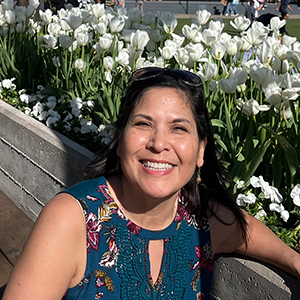 WBCC Involvement
WBCC Involvement
Executive Director (2015–18)
Board Member (2015–18)
Member, Education, Policy and Rare Chair Affair Committees (2015–18)
Member, Policy Committee (2023–present)
When did you first become a part of the WBCC? What were your reasons for joining the organization?
In 2015, I was seeking to develop professionally in the nonprofit world. I appreciated the mission and focus of WBCC and believed I would be honoring my sister, Darlene, who passed away from breast cancer in 2006 at the age of 39, with my service.
What do you consider the most significant achievements of the WBCC?
Policy and advocacy are critical pieces of making change, but to the general public, this work can be a hard sell. WBCC has always done a good job educating people in Wisconsin about the importance of policy and advocacy and their connection to real advances for people with breast cancer and for public health. WBCC’s achievements in ensuring research funds through the U.S. Department of Defense; its statewide advocacy on issues of access to medical services that support breast health (e.g., the Well Woman Program, Sister Pact, current legislation to support proper screening modalities for women with dense breasts, etc.); its educational programs to build awareness of current issues impacting breast health; and finally, its role as a resource for the wider breast cancer community in Wisconsin on issues of policy, research and medical advances, have been life-changing for many Wisconsinites.
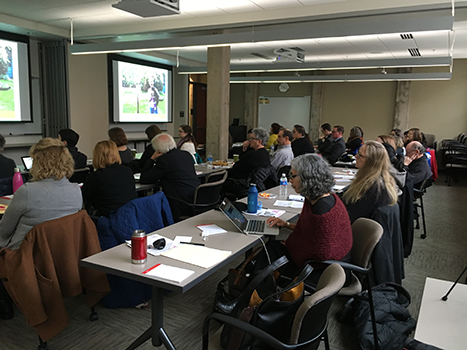
What are the two or three most important contributions you have made to the WBCC?
During my tenure as executive director, I was most proud of building strong Policy and Education Committees that were actively engaged with the issues. I also was proud of our role in regularly updating stakeholders around the state and in breaking down barriers between organizations, through the Breast Cancer Roundtable sponsored by the Wisconsin Comprehensive Cancer Control Program.
What challenges has the WBCC faced in its history? What challenges do you see the organization facing in the future?
WBCC is a very small nonprofit with a narrow focus, and finding enough financial support has always been difficult; here again, policy is a hard sell to donors and fundraising for a small nonprofit also is always a challenge. Having an active, engaged and productive volunteer board is challenging (it is for all nonprofits). I see a need for the financial means to hire sufficient staff to carry the organization forward.
Who are two or three members of the WBCC who should be recognized as part of the organization’s history? Why are they important?
Kathleen Harris: survivor, founding member, policy involvement, involvement in the National Breast Cancer Coalition (NBCC) and nationwide advocacy
Dawn Anderson: early member, long-time executive director, statewide and nationwide policy involvement
Lindsey O’Connor: survivor, Rare Chair artist, volunteer, board president
What has your involvement with the WBCC meant to you?
WBCC helped me focus on something important during a transition period in my life. I felt like I was making a difference in people’s lives, learning so much and honoring my sister.
Are there any stories you would like to share about the organization and your participation in it?
I always enjoyed spending time with the Rare Chair Affair artists while they were painting their chairs, and watching their creativity spark healing moments. Sometimes telling the story of their chairs would result in tears, sometimes in laughter, and it was a powerful experience for many of the artists. I loved how a casual conversation with Ryan McFadden at Genentech became a seed for the Sister Pact campaign.
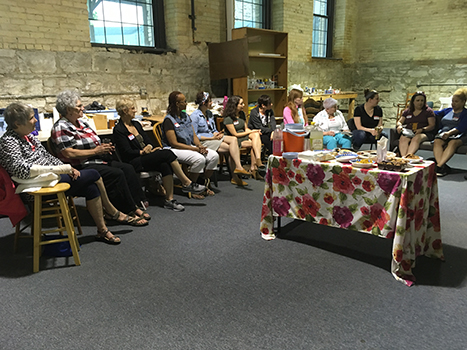
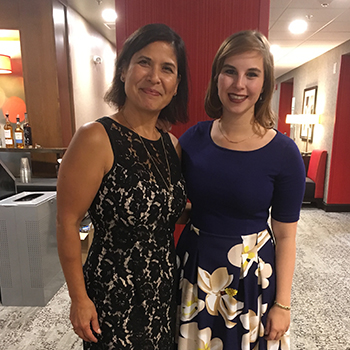
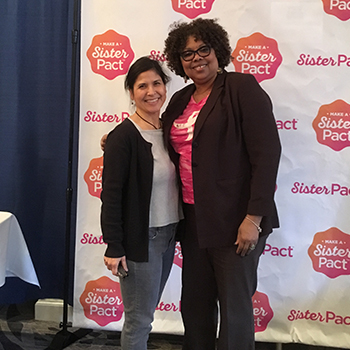
Sandra and WBCC policy specialist Hayley Young, c. 2017
Sandra and Gloria Singleton-Young (Susan G. Komen – Wisconsin) at an event to promote Sister Pact, c. 2017
